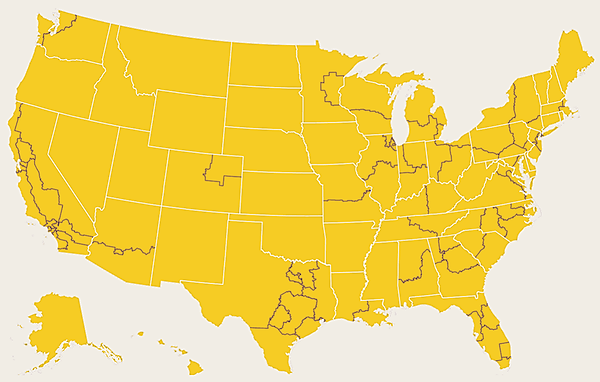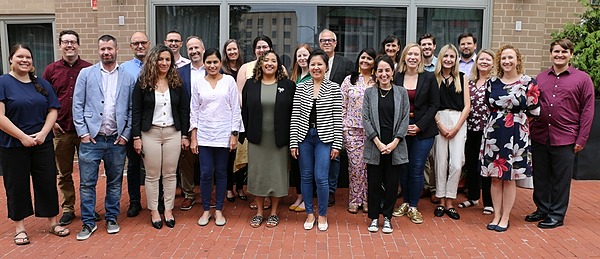|
Dear John,
For many Americans, October is a month for monsters, candy, and fall foliage. For FairVote, it’s time to make the most of opportunities in the November’s elections. Please make a plan to vote, if you’re eligible, and here are some of the key races and stories where we’re tracking: |
|
|
|
|
Voting Reform on the Ballot
This year more jurisdictions are voting on ranked choice voting (RCV) ballot measures than ever before. The 10 measures include a statewide referendum on Final Five RCV in Nevada, plus city and county measures everywhere from Maine to the largest cities in Oregon and Washington. FairVote Action has more information on all of them.
This month we took a deep dive into Evanston, Illinois’s RCV ballot measure to kick off our fall webinar series! We were lucky to be joined by Evanston Mayor Daniel Biss, Andrew Szilva of FairVote Illinois, and Brian Bosire of FairVote Minnesota to discuss what RCV would mean for the city and the state. You can find the full recording on our YouTube channel.
Keep an eye out for an invitation to join our Ready, Set, Vote: Ballot Measures in 2022 webinar, coming up in late October. Hear from panelists in Washington and Oregon about RCV ballot measures in those states and ways you can help them win!
We’re also paying attention to the 6 other statewide voting reform ballot measures around the country. They include Oregon, where voters will decide whether legislators who miss too many session days will be barred from re-election; Michigan, where residents are voting on sweeping changes to elections that include a constitutional right to vote without intimidation; and FairVote’s home state of Maryland, where voters have the option to strengthen the requirement for legislators to reside in their districts. |
|
|
|
|
The Great Alaska Rematch
Alaska made history in August as the first state to use ‘Final Four RCV’ to pick a member of Congress. Democrat Mary Peltola had a come-from-behind win, thanks to embracing RCV, running a positive campaign, and picking up lots of second choice support after Republican Nick Begich was eliminated.
In less than a month, there will be a rematch for that seat, once again featuring Peltola, Begich, and Republican Sarah Palin - plus one new candidate, Libertarian Chris Bye. This time the polls show that Peltola might win re-election with majority support in the first round, but we won’t know until all the votes are counted.
RCV will also be used this year to elect Alaska’s Governor, U.S. Senator, and state legislators in a slew of hotly contested races that will of course be won by a representative mix of candidates from across the spectrum.
|
|
|
|
|
Will Senate control come down to another Georgia runoff?
Control of the U.S. Senate is a toss-up this year, and there’s a real chance it will come down to a holiday season runoff in Georgia for the 2nd cycle in a row. The latest polling averages show Senator Raphael Warnock just shy of 50% support, with Libertarian Chase Oliver earning several points as well.
FairVote and Third Way have studied runoff elections extensively. The data is clear: runoffs almost always have lower turnout than the initial election, especially among working class voters and people of color, making the electorates and outcomes less representative. They can also cost millions of dollars by duplicating costs for administrators and equipment. RCV accomplishes the same goal of majority rule without either drawback - and avoids what could be another billion dollars in campaign spending if the runoff might determine control of the Senate in 2023.
|
|
|
|
|
The latest research: fair maps are possible!

Gerrymandering went into overdrive this year. In some past redistricting processes the number of contested seats has increased for at least one cycle, but this year the number of competitive House districts plummeted, meaning fewer Americans will decide which party controls Congress - take a look at our Monopoly Politics report on how straightforward it is to project winners without any knowledge of campaign spending or representatives’ voting records. Lots of incoming members will enter office unpopular, having won primaries in crowded fields even while most members of their own party didn’t want them.
As bad as gerrymandering is, it’s also easy to fix! Our partners at FairVote Action drew fair maps for every state in the country by using multi-member congressional districts. Browse the map to see how they did it and what your state could look like!
|
|
|
|
|
RCV makes the news
Editorial boards just can’t stop backing RCV! Right in our home state, Maryland’s Daily Record, which came out against RCV a few years ago, just published an editorial saying they had changed their minds after learning more. |
|
|
|
|
"Since we last wrote on this topic, confidence in the current electoral system has declined precipitously. We think that a change that may inspire voters to believe their votes are more likely than not to “count” would be a healthy step towards reversing this decline.” - The Daily Record" |
|
|
|
|
We’ve also kept getting our own message out. Coauthored with Stan Lockhart, my commentary on RCV as fair for everyone ran in papers all over the nation, and Dave Daley wrote a piece in the Guardian about how ranked choice voting would make Detroit’s elections more representative. |
|
|
|
|
 | What's happening at FairVote?
FairVote is excited to welcome Elijah Minter as our People and Culture Manager and Elizabeth Battiste as Deputy Director of Advocacy. They will provide our team with crucial capacity for building out partnerships with allies, making new connections with legislators, and strengthening our organizational culture.
We’re currently hiring an Executive Assistant, Social Media Associate, and Senior Policy Counsel. Stay tuned for more hiring soon – and we are so grateful to our supporters who make this work possible! |
|
|
|
Thoughts from the CEO
One of FairVote’s fellow co-founders Steven Hill is editing the DemocracySoS substack. Here’s an excerpt from a recent piece I submitted there with lessons from my experiences seeing RCV in practice.
“For candidates:
- Make it clear you plan to rank candidates yourself and urge your supporters to use their rankings. Suggesting you won’t rank, or urging supporters to rank only you, isolates you from the field and other candidates’ supporters. It’s what Sarah Palin did this year in the special congressional election in Alaska, and it clearly hurt her – only half of the backers of her fellow Republican in last place ranked her as a second choice.
- Look to engage with all voters. If you see a yard sign for an opponent in front of a house, it's still worth a conversation. Earning a 2nd choice can help you win - and help you govern if you do win. Most RCV winners are ranked 1st, 2nd or 3rd by more than two-thirds of voters.
- Be ready to explain why you're the best choice in contrast to other candidates, but be ready to say where you agree with them as well. Establishing common ground is healthy for our political discourse, and can earn you more 2nd or 3rd choice support.” |
|
|
|
|
Thanks for reading!
Sincerely,
Rob Richie FairVote President and CEO
Your support makes our work for better elections possible. If you can, please consider making a tax-deductible donation. |
|
|
|
|
|
| |
|